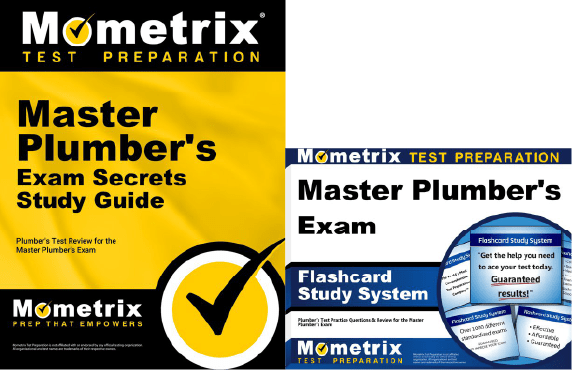If you need help studying for a master plumber test or just want some more information about what these test is like, you’ve come to the right place.
Click below to take a free master plumber practice test!
What’s on the Test?
The test is slightly different in every state, but these are the most common topics you’ll come across:
General Plumbing Regulations
- Plumbing codes
- Administrative procedures
- Safety regulations
Piping, Valves, and Controls
- Pipe materials
- Pipe sizing calculations
- Pipe joining methods
- Pipe hangers and supports
- Thermal expansion and contraction
- Water hammer
- Types of valves
- Valve sizing and pressure ratings
- Pressure regulators and relief valves
- Temperature and flow control
- Actuators
Fixtures, Fittings, and Equipment
- Types of plumbing fixtures
- Installation requirements
- Water consumption standards
- Accessibility requirements
- Repair and maintenance
- Types of fittings for different pipe materials
- Selection and installation of fittings
- Water heaters
- Pumps
- Dishwashers and washing machines
- Water treatment equipment
- Grease interceptors and traps
Drain, Waste, and Venting
- Types of drainage pipes and fittings
- Drainage system design
- Indirect waste piping
- Special waste handling
- Purposes of venting
- Types of vents
- Vent sizing and termination requirements
- Air admittance valves and limitations
- Island venting
- Types of traps
- Trap seal depth and protection
- Trap installation and maintenance
Backflow
- Potential sources of contamination
- Cross-connection control
- Types of backflow preventers
- Testing and maintenance procedures
Water Supply and Distribution
- Water sources and quality
- System design and sizing
- Installation practices
- Cross-connection control
Septic and Sewer Systems
- Components of a septic system
- Design considerations
- Connection requirements
- Sewer mains and laterals
- Grease and sand interceptor requirements
Journeyman Plumber vs. Master Plumber
There are some key differences between a journeyman licensed plumber and a master plumber contractor:
Licensed Plumber
A journeyman plumber is a plumber who has completed an apprenticeship and passed a licensing exam. They typically have 4-5 years of training and must work under the supervision of a master plumber.
Licensed plumbers are qualified to install, repair, and maintain plumbing systems in both commercial and residential settings.
Master Plumber
A master plumber is a contractor who has several years of experience as a journeyman plumber and passed an advanced licensing exam. They typically have 2-5 years of training beyond the journeyman level.
Master plumbers are qualified to design plumbing systems, pull permits, and run a plumbing business. They also supervise journeyman plumbers.
FAQs
How many questions are on the master plumber exam?
It varies from state to state, but the test usually contains around 90-120 questions.
How long is the master plumber exam?
It varies from state to state, but the test usually lasts for 3-4 hours.
What is the passing score for the master plumber exam?
The passing score varies from state to state but is generally 70%-75%.
How much does the master plumber exam cost?
The testing fees vary from state to state.





